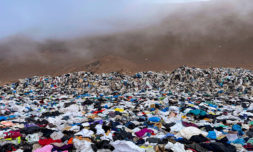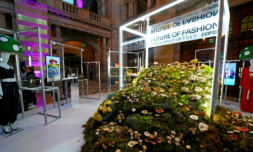Fast fashion giant ‘SHEIN’ creates cheap clothes in thousands of new styles – daily. Pressure from consumers has encouraged the brand to hire a head of sustainability this week. But for these kinds of unethical and profoundly exploitative business models, appealing to the ‘green’ market means little for its workers and the planet.
If you’ve ever browsed SHEIN its likely you’ve been reeled in by their staggeringly cheap prices and unfathomable range of products. Everything from shapewear to nail kits, designer knockoffs to pet toothbrushes (yes, really) can be found on the e-commerce site.
The gimmickier products, like a colour changing stuffed octopus, are usually reserved for viral Instagram ads. But it’s SHEINs range of cheap clothing that really draws in the punters.
If a fashion label launches a new dress, chances are it’ll have cropped up on SHEIN – albeit in a much cheaper, polyester-ridden form – before the end of the day.
This rapid production process has garnered criticism from fashion lovers and eco-conscious netizens since the company started in 2008. But it’s a recent boom in popularity, with the brand ideating its own talent contest for young designers this summer (hosted by none other than Khloe Kardashian), that has really seen pitchforks sharpen.
According to Business of Fashion, SHEIN hired a head of sustainability this week, a testament to growing pressure from their (largely Gen Z) audience. The brand has managed to keep their loyal customer base close through a domination of social media platforms like TikTok and Instagram. But this is the same demographic spearheading climate initiatives and slow-fashion discourse.
Despite publicised efforts to ‘reform’ their business model, SHEIN remains the darling of media controversy. Only last week, Health Canada recalled a ‘toxic’ SHEIN kids’ jacket after it was found to contain 20 times the amount of allowable lead in children’s products.
Back in November, Public Eye, a Swiss watchdog group, released a report outlining SHEINs disreputable labour conditions. Certain manufacturers in Guangzhou, China, where the brand is headquartered, were found to be little more than make-shift factories set up in residential buildings. Others had barred windows with no emergency exits.
Workers told Public Eye that they often sewed for 12 hours a day, working 75 hours a week, with one day off per month. This violates Chinese labour laws, which state working weeks should exceed no more than 40 hours, and workers should be granted one day off per week.
Despite the squalid inner-workings of the brand, a glossy veneer touts sustainable practice and quality product to a bargain-hungry public. According to their website, small batch production of new products ensures ‘no raw materials are wasted’. Yet based on their ‘new daily’ filter, one can easily see that over 6000 products are uploaded to site on any given day.


















